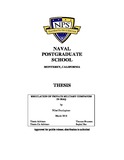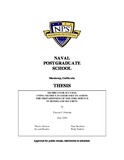Regulation of private military companies in Iraq
| dc.contributor.advisor | Bruneau, Thomas | |
| dc.contributor.advisor | Ear, Sophal | |
| dc.contributor.author | Dumlupinar, Nihat | |
| dc.date.accessioned | 2012-03-14T17:45:27Z | |
| dc.date.available | 2012-03-14T17:45:27Z | |
| dc.date.issued | 2010-03 | |
| dc.identifier.uri | https://hdl.handle.net/10945/5452 | |
| dc.description.abstract | This thesis examines problems that states face when using private military companies (PMCs) and possible solutions for solving those problems. The main argument of this thesis is that the problems and their solutions are not the same for all states. They change mainly because of the capability of state institutions such as the Ministry of Defense, national laws, and public armed forces. For that reason, the problems and solutions are examined from the aspect of two types of states: strong state and weak state. The use of private military companies in Iraq, which represents two types of states (the U.S. and Iraq), is the main case of this thesis. The goal of this thesis is to answer the following questions: Which theory of civil military relations can be a guide for regulating PMCs from the aspects of control, effectiveness and efficiency? What are the main challenges of the U.S. as a strong state and of Iraq as a weak state? What are the motives and capabilities of the U.S. and Iraq to regulate PMCs? How can national regulations be supported at the international level? In this context, principal agent theory and new institutionalism can explain the structure and current tensions of state-PMCs relations. The solutions for regulation mainly depend on the capabilities of national institutions, which affect the principal-agent relations between states and PMCs. Weak states, such as Iraq, are more vulnerable to the challenges PMCs cause than strong states such as the U.S. Moreover, weak states do not have sufficient capacity to solve the problems in the near future, except by putting limitations on foreign PMCs and operational functions. In contrast, strong states have the capacity for solving these problems. They need political will, however, to do so. Moreover, international regulation is an indispensible element for effective regulation over private military industry due to the industry's transnational feature. | en_US |
| dc.description.uri | http://archive.org/details/regulationofpriv109455452 | |
| dc.format.extent | xvi, 101 p. ; | en_US |
| dc.publisher | Monterey, California. Naval Postgraduate School | en_US |
| dc.rights | This publication is a work of the U.S. Government as defined in Title 17, United States Code, Section 101. Copyright protection is not available for this work in the United States. | en_US |
| dc.subject.lcsh | National security | en_US |
| dc.subject.lcsh | Privacy | en_US |
| dc.subject.lcsh | Treaties | en_US |
| dc.subject.lcsh | Terrorism | en_US |
| dc.subject.lcsh | Prevention | en_US |
| dc.title | Regulation of private military companies in Iraq | en_US |
| dc.type | Thesis | en_US |
| dc.contributor.corporate | Naval Postgraduate School (U.S.) | |
| dc.contributor.department | Security Studies | |
| dc.description.service | Turkish Army author | en_US |
| dc.identifier.oclc | 609682246 | |
| etd.thesisdegree.name | M.A. | en_US |
| etd.thesisdegree.level | Masters | en_US |
| etd.thesisdegree.discipline | Security Studies | en_US |
| etd.thesisdegree.grantor | Naval Postgraduate School | en_US |
| etd.verified | no | en_US |
| dc.description.distributionstatement | Approved for public release; distribution is unlimited. |
Files in this item
This item appears in the following Collection(s)
-
1. Thesis and Dissertation Collection, all items
Publicly releasable NPS Theses, Dissertations, MBA Professional Reports, Joint Applied Projects, Systems Engineering Project Reports and other NPS degree-earning written works.





